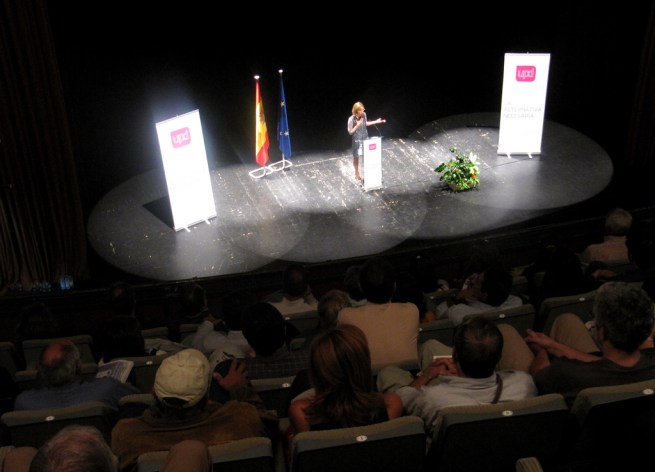
If you’re like me, public speaking is an unnatural experience. Add to that the fact that, during a Demo Day presentation, you need to summarize your entire startup in 2-5 minutes, and the stress quickly builds up.
[aditude-amp id="flyingcarpet" targeting='{"env":"staging","page_type":"article","post_id":791086,"post_type":"guest","post_chan":"none","tags":null,"ai":false,"category":"none","all_categories":"entrepreneur,","session":"C"}']How do you calm your nerves, hone that story, and shine in front of a packed audience of investors and press? Here are seven factors that helped our team craft a winning pitch at the Rock Health Demo Day (and propel our startup, LabDoor, to a successful seed round):
Own your call-to-action
If you’re lucky (and good), the audience will remember only one thing about your pitch. Are you looking for a key investor, customer, or hire? When you’re writing your pitch, sculpt the entire story around a targeted call-to-action to this person.
AI Weekly
The must-read newsletter for AI and Big Data industry written by Khari Johnson, Kyle Wiggers, and Seth Colaner.
Included with VentureBeat Insider and VentureBeat VIP memberships.
Don’t be the company that ends their pitch by saying “please come talk to us after the event.” Challenge the audience to do something. Bribe them with a free coupon to try your product. Give investors a one-week window to get into your seed round. Be memorable and actionable.
Focus on design
The majority of the audience will have never heard of you or your product. For better or worse, they will use your presentation design as a heuristic to judge your product quality.
Great design is now essential to product development. The new generation of billion-dollar startups, like Tumblr and Fab, has simple, beautiful, intuitive design at their core. Make sure you leave a good impression with your slides.
I can’t take any credit for my startup’s success in this area, which should be attributed to my cofounder, Rafael Ferreira. If you don’t have an all-star designer on your team, keep your slides simple and intuitive. Think Steve Jobs introducing the iPhone. Minimize text, use a simple background, and limit yourself to one message per slide.
And don’t use video clips. They are distracting, and they break.
Work a real crowd
A wise mentor once told me, “The first five times you give any speech, you’ll be terrible.” That’s because there’s so much more to public speaking than the words and slides. If you don’t interact with the crowd and feed off its energy, your message will fall flat.
[aditude-amp id="medium1" targeting='{"env":"staging","page_type":"article","post_id":791086,"post_type":"guest","post_chan":"none","tags":null,"ai":false,"category":"none","all_categories":"entrepreneur,","session":"C"}']
Find a group of strangers willing to listen to your early pitches. Sign up for Startup Digest and be on the lookout for public entrepreneur meetups and pitch events. Volunteer to speak at a local high school or college. Work on your new material in low-pressure situations, and you’ll feel much more comfortable when D-Day comes around.
Drop the mic (literally)
You have your speech memorized. Now practice making a mistake.
It sounds crazy, but something always goes wrong in the real pitch. The slides get out of order. The clicker runs out of batteries. You trip and fall on your way to the stage. Even seemingly good things can throw you off your game. I’ve seen speakers get completely flustered when the audience laughs at one of their jokes.
So I practiced dropping my mic or clicker, picking it up, composing myself, and getting back on track with the pitch. I practiced with and without slides. I practiced facing a brick wall. Anything to throw me off my game.
[aditude-amp id="medium2" targeting='{"env":"staging","page_type":"article","post_id":791086,"post_type":"guest","post_chan":"none","tags":null,"ai":false,"category":"none","all_categories":"entrepreneur,","session":"C"}']
Most people in the audience won’t even notice if you get stuck for a second. Learn to relax and get back on track smoothly, and you’ll be fine.
Get in the zone
On the morning of the big day, try to get to the event location as early as possible. Keep the whole day free of work and distractions – it will be hard to concentrate on anything else anyway. Walk on stage and get comfortable with the environment. Run through your pitch once or twice, but don’t obsess over it. You’ve practiced hundreds of times for this moment. You are ready.
Drop the mic (figuratively)
I’ve seen this happen over and over again. Entrepreneurs stress about Demo Day for weeks or months. They make mistakes at every pitch practice. And then, magically, they have the best pitch of their lives on the big stage. There’s something special about walking onto the stage with the bright lights on you and darkness over the audience that brings the best out of people. It’s your big moment – go out there and crush it.
Follow up immediately
The best Demo Day pitch in the world means nothing if you don’t close the deal. Identify your top targets, and track them down. Use your team to your advantage here – divide and conquer, starting in the lobby of the event. Timing is essential. Excitement will be high on Demo Day, but it’s up to you to keep up the momentum in the following days and weeks. Close your seed round. Win over that big customer.
[aditude-amp id="medium3" targeting='{"env":"staging","page_type":"article","post_id":791086,"post_type":"guest","post_chan":"none","tags":null,"ai":false,"category":"none","all_categories":"entrepreneur,","session":"C"}']
Then, keep building.
Neil Thanedar is CEO & Founder of LabDoor, a digital health startup that uses science to tell consumers what’s really inside dietary supplements. Before LabDoor, Neil founded Avomeen Analytical Services, an FDA-registered product safety laboratory, and also worked on emerging mobile sports and medical device products. He owns degrees in Cellular & Molecular Biology and Business Administration from the University of Michigan.
The Young Entrepreneur Council (YEC) is an invite-only organization comprised of the world’s most promising young entrepreneurs. In partnership with Citi, the YEC recently launched #StartupLab, a free virtual mentorship program that helps millions of entrepreneurs start and grow businesses via live video chats, an expert content library and email lessons.
Image via ►tripu / Compfight cc
[aditude-amp id="medium4" targeting='{"env":"staging","page_type":"article","post_id":791086,"post_type":"guest","post_chan":"none","tags":null,"ai":false,"category":"none","all_categories":"entrepreneur,","session":"C"}']
VentureBeat's mission is to be a digital town square for technical decision-makers to gain knowledge about transformative enterprise technology and transact. Learn More
